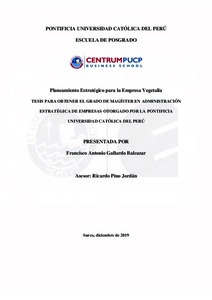| dc.contributor.advisor | Pino Jordán, Ricardo Miguel | |
| dc.contributor.author | Gallardo Balcazar, Francisco Antonio | |
| dc.date.accessioned | 2019-12-12T17:11:18Z | |
| dc.date.available | 2019-12-12T17:11:18Z | |
| dc.date.created | 2019-12 | |
| dc.date.issued | 2019-12-12 | |
| dc.identifier.uri | http://hdl.handle.net/20.500.12404/15535 | |
| dc.description.abstract | Vegetalia es una empresa peruana que fabrica margarinas especiales desde el siglo XX en el
sector industrial de alimentos y su crecimiento va de la mano con el de la industria
alimentaria en el Perú, ya que es un sector que está en constante evolución. Prueba de ello es
que, en noviembre del 2004, la tercera generación de la familia Rodríguez inició una nueva
etapa en el negocio, donde en el año 2008 inauguraron su nuevo local en el primer Centro
Industrial de Lurín, lo que conllevó a la empresa a innovar para no quedar fuera. Frente a una
economía mundial tan cambiante, las necesidades y exigencias de los clientes hacen que las
empresas reformulen o adapten nuevas estrategias para el beneficio de los consumidores y el
suyo propio. El objetivo principal de este plan estratégico es identificar fortalezas,
debilidades, oportunidades y amenazas, tanto internas como externas, que influyen en la
empresa Vegetalia. Esto se realizó a través de la recopilación de información interna y
externa de la misma organización, que el gerente administrativo de Vegetalia, Juan Ramírez,
proporcionó en varias oportunidades y que permitió ofrecer una serie de recomendaciones
para que la empresa genere valor agregado en el mediano y largo plazo, manteniendo y
mejorando su posición en el mercado nacional. Se llegó a la conclusión de que la empresa
Vegetalia posee grandes intereses que están alineados con sus más urgentes necesidades de
desarrollo y expansión, pues ha sabido estar durante todos estos años a la vanguardia de la
globalización, a pesar de contar con competidores tan grandes como Alicorp y Unilever Perú.
Se recomienda, asimismo, que la organización debe generar nuevas ventajas competitivas a
través del desarrollo de la innovación y su participación en un clúster potencial que le permita
mejorar estratégica y operativamente con el fin de crear una cultura cooperativa y de
aprendizaje, apoyada por el Estado, para mejorar los niveles de vida de la población a través
de organizaciones que generan alto valor agregado. | es_ES |
| dc.description.abstract | Vegetalia is a Peruvian company that manufactures special margarines since the last century
in the industrial food sector and its growth goes hand in hand with the growth of the food
industry in Peru, since it is a sector that is constantly evolving. Proof of this, in November
2004, the third generation of the Rodríguez family started a new stage in the business, where
in 2008 they opened their new premises in the first Industrial Center of Lurín, which led the
company to innovate or stay out. In the face of such a changing global economy, customer
needs and demands make companies reformulate or adapt new strategies for the benefit of
consumers and the economic benefit of organizations. The main objective of this Strategic
Plan is to identify internal and external strengths, weaknesses, opportunities and threats that
influence the Vegetalia company, this was done through the collection of both internal and
external information of the same organization, as the Administrative Manager of Vegetalia
Mr. Juan Ramírez provided on several occasions and it came to the end to make a series of
recommendations for the company to generate added value in the medium and long term,
maintaining and improving its position in the national market. As a final conclusion, the
company Vegetalia, has great interests that are aligned with its most urgent development and
expansion needs, Vegetalia has been at the forefront of globalization all these years despite
having competitors as large as Alicorp and Unilever Peru. And it is recommended that the
organization must generate new competitive advantages through the development of
innovation and its participation in a potential cluster that allows it to improve strategically
and operationally in order to create a cooperative and learning culture, supported by the State.
With the objective of improving the living standards of the population through organizations
that generate high added value. | es_ES |
| dc.language.iso | spa | es_ES |
| dc.publisher | Pontificia Universidad Católica del Perú | es_ES |
| dc.rights | info:eu-repo/semantics/openAccess | es_ES |
| dc.rights.uri | http://creativecommons.org/licenses/by-nc-nd/2.5/pe/ | * |
| dc.subject | Alimentos--Industria y comercio--Perú | es_ES |
| dc.subject | Planificación estratégica | es_ES |
| dc.title | Planeamiento estratégico para la empresa Vegetalia | es_ES |
| dc.type | info:eu-repo/semantics/masterThesis | es_ES |
| thesis.degree.name | Maestro en Administración Estratégica de Empresas | es_ES |
| thesis.degree.level | Maestría | es_ES |
| thesis.degree.grantor | Pontificia Universidad Católica del Perú. CENTRUM | es_ES |
| thesis.degree.discipline | Administración Estratégica de Empresas | es_ES |
| renati.advisor.dni | 08201984 | |
| renati.author.dni | 42960898 | |
| renati.discipline | 413307 | es_ES |
| renati.level | https://purl.org/pe-repo/renati/level#maestro | es_ES |
| renati.type | https://purl.org/pe-repo/renati/type#tesis | es_ES |
| dc.publisher.country | PE | es_ES |
| dc.subject.ocde | https://purl.org/pe-repo/ocde/ford#5.02.04 | es_ES |






